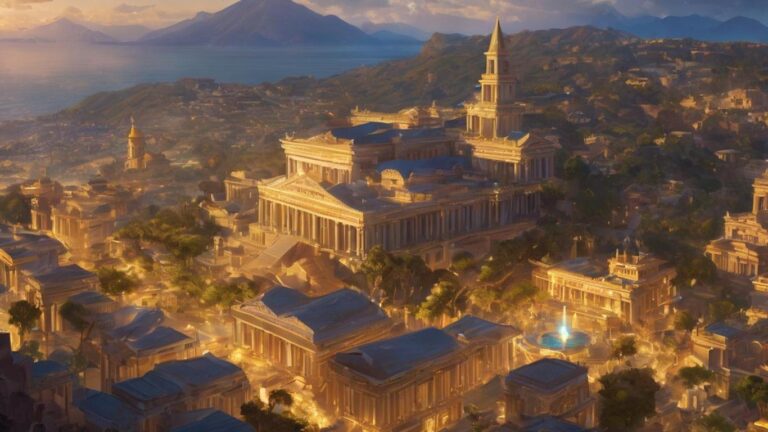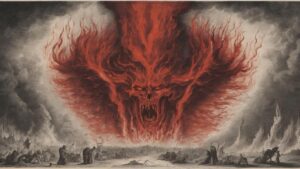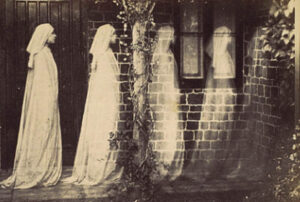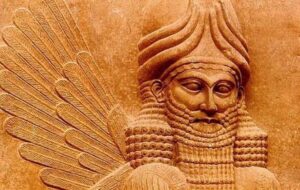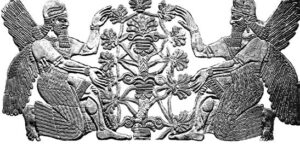Table of Contents
During the 16th and 17th centuries, Spanish exploration in South America gave rise to the concept of El Dorado. The term “El Dorado” means “The Golden One” in Spanish and was connected to a mythical city or ruler believed to have immense wealth, especially in gold. The legend focused on the indigenous peoples of the Andes region, specifically the Muisca people in present-day Colombia.
According to the myth, the Muisca ruler or chief would cover himself in gold dust and ceremonially plunge into a lake, offering precious objects to the gods. The allure of the Golden City motivated Spanish explorers like Francisco Pizarro and Gonzalo Jiménez de Quesada to undertake expeditions hoping to discover this legendary wealth.
Despite numerous quests, the Golden City remained elusive, and the legend gradually transformed into a symbol of an unattainable golden paradise.
The Myths:
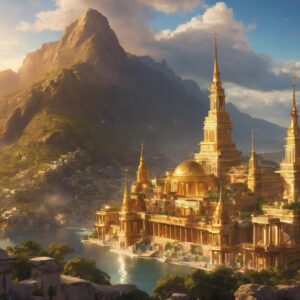
“Golden city” has been a subject of fascination for centuries, and various versions and interpretations exist across different cultures and historical periods. Here are a few notable variations and related myths:
Manoa. In addition to El Dorado, the term “Manoa” has served as a synonym for the legendary city of gold. Some explorers maintained the belief that Manoa was an alternate name for the same mythical place, while others speculated that it represented a distinct golden city.
Lake Parime. Sometimes, the legend of El Dorado associates itself with the mythical Lake Parime. Explorers held the belief that the immense wealth attributed to El Dorado originated from this lake situated in the Amazon rainforest.
City of Z. In the early 20th century, British explorer Percy Fawcett proposed the existence of a lost ancient city in the Amazon, which he called the “City of Z.” While Fawcett didn’t explicitly connect it to El Dorado, the concept of a hidden, ancient city with treasures draws parallels to the El Dorado myth.
White City (Ciudad Blanca). Legends of a White City exist in various cultures, including indigenous Mesoamerican and Central American societies. While not directly related to El Dorado, the idea of a hidden, prosperous city shares similarities with the broader theme of mythical, unreachable places.
Golden Kingdoms of Southeast Asia. In Southeast Asian cultures, there are legends of mythical golden kingdoms or cities hidden in the mountains or jungles. These stories share similarities with the El Dorado myth, reflecting the universal human fascination with hidden treasures.
Symbolism:
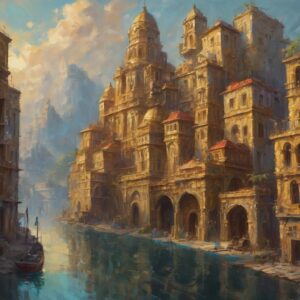
The legend of El Dorado is a powerful symbol across different contexts, representing various concepts and themes. Here are some interpretations:
El Dorado symbolizes unattainable wealth and prosperity, reflecting the human desire for abundance.
The allure of El Dorado motivated explorers during the Age of Exploration, symbolizing ambitious pursuit and discovery.
The Golden City, elusive and never found, symbolizes the futility of some pursuits and the illusory nature of ambitions.
In the Muisca ceremony at Lake Guatavita, El Dorado represents a sacred connection between earthly and divine, signifying spiritual significance.
The quest for El Dorado often intertwines with colonial history, symbolizing the exploitation of indigenous peoples and their lands.
Despite its elusive nature, El Dorado is also interpreted as a symbol of hope and possibility.
El Dorado embodies mythical elements, capturing the human spirit through legendary tales of imagination.
The symbolism of El Dorado is multifaceted, encompassing both positive and cautionary themes, evoking emotions and ideas.
Modern culture:
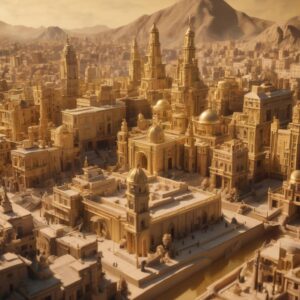
Literature and Film. The legend of El Dorado has inspired numerous works of literature and film. Authors and filmmakers often draw on the allure of the mythical golden city to explore themes of adventure, ambition, and the human quest for wealth. Examples include novels like “The Lost City of Z” by David Grann and films like “The Road to El Dorado.”
Tourism and Exploration. The mystique of El Dorado enhances the allure of specific historical and archaeological sites. Travelers and explorers are drawn to regions linked with the El Dorado legend, such as Lake Guatavita in Colombia, to immerse themselves in the cultural and historical significance associated with the myth.
Metaphorical Use. People sometimes use the term “El Dorado” metaphorically to portray a place of significant wealth or opportunity. In business and finance, for example, individuals may employ it to describe a lucrative market or investment.
Cultural Celebrations. Cultural celebrations and events sometimes incorporate the myth of El Dorado. Festivals, art exhibitions, and performances may draw inspiration from the legend, creating a bridge between historical mythology and contemporary cultural expression.
Marketing and Branding. The allure of El Dorado is occasionally employed in marketing and branding strategies. Businesses or products may use the concept to evoke a sense of exclusivity, luxury, or hidden treasure.
Scientific Exploration. Some scientific expeditions and archaeological projects are motivated by the desire to uncover the historical truths behind mythical tales, including the quest for El Dorado. Advances in technology and exploration techniques have led to ongoing efforts to investigate potential sites associated with the legend.
Overall, while the myth of El Dorado originated in historical narratives, its enduring appeal and adaptability make it a cultural touchstone with continued relevance in contemporary society.
FAQ
Which country has El Dorado?
The legends of El Dorado are associated with various South American countries, primarily Colombia.
Does El Dorado still exist?
No, El Dorado is a mythical city, and there is no historical evidence to support its existence.
Where is El Dorado held?
El Dorado is not a physical location but rather a legendary city of immense wealth. It has been often associated with the legends of Lake Guatavita in Colombia.
Does El Dorado take place in Mexico?
No, El Dorado is not associated with Mexico. The legends are more closely tied to South American regions, particularly Colombia.
Is El Dorado in Africa?
No, El Dorado is not in Africa. It is a South American mythical city.
How accurate is El Dorado?
The existence of El Dorado is not supported by historical evidence. It is considered a mythical and legendary concept rather than a real location.
Why did El Dorado fail?
El Dorado did not fail because it was never a real city. The stories of El Dorado are likely based on indigenous rituals involving gold, which European explorers misinterpreted.
Do they get the gold from El Dorado?
No, as El Dorado is a mythical city, no one has ever obtained gold from it.
What's El Dorado in English?
El Dorado translates to "The Golden One" in English.
How long did El Dorado last?
El Dorado is a legend that has persisted for centuries, and it continues to capture the imagination. However, in historical terms, it was never a real place, so it did not have a duration.
Who is El Dorado in India?
There is no direct equivalent of El Dorado in Indian mythology. The concept is specific to South American legends.
Who were the explorers who tried to find El Dorado?
Various explorers, including Gonzalo Pizarro and Sir Walter Raleigh, were among those who sought to find El Dorado.
Did Europeans ever find El Dorado?
No, European explorers did not find El Dorado because it is a mythical city.
Is there a city of gold?
No, there is no historical evidence of a city made entirely of gold. The concept of a "city of gold" is often associated with myths and legends.
What is the gold city of the world?
There isn't a specific "gold city of the world" in reality. The idea of a golden city is more of a metaphorical or symbolic concept in various cultural and literary contexts.
